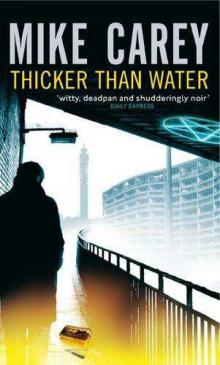- Home
- P J Parrish
South of Hell (Louis Kincaid Mysteries) Page 3
South of Hell (Louis Kincaid Mysteries) Read online
Page 3
Louis glanced at his watch.
“I’ll ask you again. You got somewhere to go, peeper?” Shockey said.
Louis looked across the table at Shockey. He was about forty but looked older. And in that moment, everything about the man seemed to crystallize. He was a dinosaur, assigned to brush the dust off a few cold cases while the young cops—the ones with diplomas—were pushing their way up in the ranks. Shockey was hearing their footsteps and was probably fighting like hell to hang on to his gold badge. Solving the case of a missing wayward wife in quiet little Ann Arbor just might help him do that. At least, for a few more years.
Louis knew, too, why Shockey had wanted to meet here instead of at the police station. He didn’t want the other cops to know he had to call on a PI to help him do his job.
“Look,” Louis said, “all I did was spot the vehicle. I sent my report to Livingston. The car was towed, and I was done. What the hell could I offer the case now?”
“You searched the car, right?”
“Of course I did. It was procedure.”
“You search it good?”
“Yeah, I searched it good.”
“You sure about that, peeper?”
What was this? He didn’t need this shit. First, he couldn’t get a cheeseburger, and now this old wash-up was on his case. But even as his body was tensing to get up and move forward, get on the road so he could see Joe, his brain was moving backward.
Back to that night at the train station, standing out in the bone-chilling sleet, chipping at the ice on the door handles so he could look inside the car. The car was unlocked, and he found nothing inside but cigarette butts and an old Arby’s bag. The trunk latch was broken, held closed by a rusted coat hanger. Cold, wet, and miserable, he had run his flashlight over the mess of tools and old newspapers, slammed the trunk shut, and retreated to his squad car to call it in.
He met Shockey’s eyes across the table. The question was still there.
“I didn’t miss anything,” Louis said.
“I still got the car,” Shockey said. He had the barest grin on his face. It pissed Louis off.
“How about if we go take another look?” Shockey said.
The impound lot was in a neighborhood of trailer parks and storage rental barns out by the airport. Shockey pulled the sedan up to the gates of the razor-wired chain-link fence, got out and hustled to the gates.
Louis watched through the slow sweep of the wipers as Shockey unlocked the heavy padlocks and swung the gate open. Louis was staring at the big yellow sign that shouted beware attack dogs as Shockey slid back into the driver’s seat.
“What about the dogs?” Louis asked.
“There’s no friggin’ dogs,” Shockey said, putting the car into gear.
Once inside the lot, Shockey parked the sedan at the side of a large metal hangar of a building. Louis got out into the cold drizzle.
A low whining noise drew his eyes up, but he couldn’t see anything in the rapidly fading light. The whine grew into an ear-splitting scream as a smudge of lights emerged from the clouds. Louis almost ducked as the jet streaked overhead and was gone.
“This way,” Shockey said.
They walked behind the building, down a row of cars, which seemed to grow older and dirtier the farther they went. They passed some motorcycles, a few boats on trailers, and an old tractor. Then came rows of old refrigerators, bicycles, and a stack of doors. The farther they went into the yard, the rustier and more random the piles of debris became. It was like some old cemetery where the fresh graves still had someone to tend them while the old ones had long been abandoned.
Louis stopped and lifted a plastic-encased tag hanging from a rusty bicycle. Written on it was a case number, a scribbled name, and the year: 1968.
“How long you guys keep this stuff?” Louis asked.
“Forever,” Shockey said, walking on. “A few years back, we had a guy who was awarded a new trial after twenty years in the pen. Lucky us, we still had the evidence, and he was convicted again.”
Louis followed Shockey around the corner of the building. The red Falcon was parked nose-in against the fence. A weather-worn tarp covered the front end, but the wind had blown it up to expose the trunk. Shockey sighed in disgust as he brushed mud and dead leaves from a back window. Then he looked back at Louis.
“This is it,” Shockey said.
Louis stepped closer and peered in the side window. The interior was clouded with gray shadows, but there was enough light to see. The ashtray was still stuffed with butts, and the Arby’s bag was still in the backseat.
“Have you had anything examined yet?” Louis asked. “Dusted the car for prints?”
“Not yet,” Shockey said. “This sat here for nine years. I told you, I just recently reopened the case.”
“Okay,” Louis said. “What was it I was supposed to have missed?”
The trunk was still secured only by the rusty coat hanger. Shockey unwound the wire and lifted the trunk. Louis peered inside. At first, he saw the same tools and old newspapers he had seen nine years ago, but then his eye caught something else. Tucked under a crumpled Detroit Free Press, the strap of a bra.
He picked up a screwdriver and used it to lift the newspaper. The bra was once white, but the fabric was dull and yellow now, the lace across the left cup rotting away. The right cup was smeared with a brown liquid.
Blood.
Louis looked at Shockey. His first impulse was to deny the existence of the bra back in 1980, but the truth was, he couldn’t be absolutely sure. In the dark and in a hurry to wrap up a report on an abandoned vehicle, it was possible he missed it.
“So, what’s the problem?” Louis asked. “This is evidence of a crime. Why haven’t you bagged it and turned it over to the lab?”
“This is why,” Shockey said. He reached into his raincoat for a piece of paper and handed it to Louis.
It was a report—his 1980 report on locating the Falcon. And it was not a copy. It was the original. Louis scanned it quickly.
Upon a routine search of the vehicle and the trunk, I arranged a tow. Tow truck responded at 12:45 a.m. Notification made to AAPD detectives and to Livingston County 12/11/80 that vehicle wanted in their BOLO had been located at 325 Depot Street, Ann Arbor, Mich. Neither Owen Brandt, owner of the vehicle, nor ATL subject, Jean Brandt, was on scene.
Louis handed the report back to Shockey. “I still don’t understand what the problem is. This report is accurate and doesn’t change your finding the bra.”
“I don’t think that’s how a defense attorney is going to see it,” Shockey said.
“What are you talking about?”
“Look at it this way,” Shockey said. “The wife disappears in December 1980. Her car is found a week later, and a cop searches it and puts in writing that there was nothing in the car to indicate a crime. Nine years later, a bloody bra turns up in the trunk.”
“Stuff like that happens.”
“It could happen if there hadn’t been a search of the trunk in 1980,” Shockey said. “Aren’t you smart enough to see how a defense attorney will play this?”
“Why don’t you tell me?”
“Okay, you’re up on the stand,” Shockey said. “Officer Kincaid, you put in your report you searched the trunk. Inside were some tools and old newspapers. Did you move the newspapers, officer? Of course I did. Did you have a flashlight, Officer? Of course I did. Then how come you didn’t see the bra, Officer? Could it be you didn’t see it because it was planted later by the police?”
Louis looked back at the trunk. He understood what Shockey was saying. He’d faced enough defense lawyers to know how things could get twisted, but he wasn’t sure that’s what this was about. The trunk wasn’t that cluttered. There was a screwdriver, a wrench, and a crowbar. An old can of oil and some newspapers. Even in the sleet, he would have sifted through it. It was procedure, and back then, he never broke procedure. No way did he miss this bra.
“Look, peeper,” Sh
ockey said, “I’m just telling you that it won’t work for a judge or a jury the way it is now. I need you to change your report.”
“You want me to say I never looked in the trunk?”
Shockey reached into his pants and withdrew a second sheet of paper. “I got a blank form here,” he said. “Just like the ones we used in 1980. I want you to rewrite everything and leave out the fact that you searched the car. Say it was frozen shut or something.”
Louis took a step back so he could get a better look at Shockey’s face.
“You’re one stupid sonofabitch,” he said.
“Let’s not get personal—”
“Not only are you asking me to commit a crime, but there are other copies of my report out there,” Louis went on. “How could you expect to get away with something like this?”
“The only other copy was in the missing persons file on Jean Brandt. And it no longer exists.”
“You destroyed it?”
Shockey was quiet, his hand still extended to Louis, the blank paper growing limp in the rain. In the gray light, the lines and whiskers on Shockey’s face looked etched in dried clay, and his eyes were swimming with a sick kind of desperate hope.
Another plane whined overhead.
“You planted the bra, didn’t you?” Louis said.
“I’m telling you, it’s Jean Brandt’s bra, and it’s our only hope of getting a warrant to search the farm,” Shockey said. “Owen Brandt is a monster. He killed her, and she’s buried out there on that farm. I know it.”
“I don’t care,” Louis said. “I won’t falsify a report for an over-the-hill dick who has no other way to hang on to his job than to lie his way into a courtroom with phony evidence.”
Louis walked away from Shockey. In the distance, he could make out the mist-fuzzed lights of the runway at Detroit Metro. The heavy air was suddenly cold. He dreaded the drive back to the city with this jerk.
“I’ll pay you!” Shockey hollered.
Louis spun to face him. “Pay me?”
Shockey came to him. “Look,” he said, “if you had any guts or brains at all, you’d still be wearing a badge. I know all about you. You barely get work as a PI, and your real job is a part-time security gig watching rich people get a tan.”
“Shut up.”
“You got three hundred smackers in the bank, a car that’s damn near older than you are, and your net income for last year wasn’t enough to feed the fishies down where you live. Tell me you couldn’t use ten grand.”
Louis wanted to slug him. “Take me back to Ann Arbor—now,” he said. “And if you say one more word about any of this on the way, I’ll report you to your chief. You got that?”
Louis walked away. When he got to the gate, he looked back. Shockey had returned to the Falcon. The wind had picked up, and he was fighting to secure the tarp back over the trunk, searching for a way to fasten it down.
The blank report was lying in the mud.
Chapter Four
The College Inn was a motel hard by the I-94 spine that connected Ann Arbor with Detroit. His room had the disinfectant, moldy-carpet smell of a place that had hosted one too many beer parties.
Louis stayed in the room just long enough to put in a call to the Echo Bay Sheriff’s Department. The dispatcher told him Undersheriff Frye was tied up all evening at a mayor’s banquet. Louis left a message and then a second one on Joe’s home phone to call him when she got in. Then he headed down to the bar.
The place was packed with bodies, noise, and smoke. Louis was wondering why a dingy bar in a rundown motel was so packed when he spotted the TV in the corner of the room.
Basketball.
Then his eyes began to pick up all the maize-and-blue ball caps and sweatshirts.
Worse, Michigan basketball.
“Turn up the fuckin’ sound, Fred!” someone bellowed.
Worse yet, the NCAA championship, Michigan versus Seton Hall.
Louis elbowed his way to the bar. It took ten minutes to get the attention of the sweating bartender.
“You serve any food here?” Louis yelled over the din of drunks and the pregame cackling of the sportscasters.
“Free tacos ’til ten,” the man said, pointing to a buffet table.
“Bring me a Heineken,” Louis said.
“Don’t got.”
Louis sighed. “Stroh’s.”
A few long pulls from the beer did a little to wash the bad taste Shockey had left. Louis ordered a second beer, and his gnawing stomach finally propelled him to the buffet, where he filled a paper plate with three soggy tacos. There was an empty stool by the waitress station, and Louis pushed in front of a beefy kid in a go blue sweatshirt to claim it.
“Hey, man!” the kid sputtered, puffing out his chest.
“Get lost,” Louis said.
The kid backed off with a scowl. Louis sat hunched over, wolfing down the tacos, his eyes on the TV but not really watching.
He was thinking about the woman with the spatula back at Krazy Jim’s and the look on her face when he screwed up his order, like she knew he didn’t belong there.
How did she know?
In his four years as a student here, he had never once set foot in Krazy Jim’s, had never gone to any of the student hangouts. No fried eggs at Angelo’s after pulling an all-nighter, no sangria at Dominick’s with a Sigma Kappa beauty, no winter-refuge pizza at the Cottage Inn, no postgame brews at the Brown Jug.
He had never felt comfortable in those places. The only place he could remember going to more than once was the old Fleetwood Diner. There he could sit in silence with his books, watching the bums and cops just coming off shift as he sipped dark chocolate milk made to order with Hershey’s syrup. No one bothered him there. He never felt out of place there.
Another lifetime ago.
“You want another?”
Louis looked at his watch. It was after ten. He shook his head, set his empty Stroh’s in the trough, and headed back up to his room.
The red button on the phone wasn’t blinking. He knew Joe was busy lately. The Leelanau sheriff, Mike Villella, was retiring, and Joe was the automatic candidate for the position in the election six months from now. She was trying hard to impress the locals, and in a town like Echo Bay, putting in an appearance at the pancake dinner meant as much as keeping the poachers in line.
Still, why the hell hadn’t she called when she knew he was only four hours away?
Louis kicked off his shoes, grabbed the remote, and lay down on the bed. He flipped on the TV. It went right to the NCAA tournament, like the satellite was programmed to pick up anything remotely to do with UM sports.
His eyes slid to the phone. He muted the game, picked up the receiver, and dialed. Mel Landeta picked up on the second ring.
“I figured you’d be at O’Sullivan’s,” Louis said.
“Raining like hell down here tonight,” Mel said. “Hold on a sec.”
The phone clattered. In the background, Solomon Burke’s “A Change Is Gonna Come” fell to a whisper. Mel picked the receiver up again.
“How’s Michigan?” he asked.
“A waste of time.”
“What does the cop need you for?”
“It’s an old missing persons case,” Louis said. “A woman disappeared nine years ago, but her car was found abandoned. I was the responding. The detective who worked the case is trying to reopen it.”
“I hear an ‘and’ coming.”
“He planted a bloody bra in the trunk, and now he wants me to change my report.”
Louis could hear the click of a lighter as Mel fired up a cigarette. “What about copies of the original?”
“Only one. He says he destroyed it.”
Mel was quiet.
“He’s a burnout who’s hearing footsteps,” Louis said. “He thinks reopening an old case is going to drown out the sound.”
Mel still didn’t say anything.
“What?” Louis said.
“Nothing,” Mel
said.
“Don’t give me that shit.”
“What you just said is something only a young man can say.”
Louis was quiet. On the silent TV screen, Glen Rice hit a jumper. Screaming and stomping thundered from the room next door.
“Maybe there’s something more,” Mel said.
“Like what?”
“Tell me more about the woman.”
“Her name was Jean. Married to some guy named Owen Brandt. They lived on a farm somewhere west of here.” He paused. “The husband reported her missing but later admitted he thought she had just run off with someone.”
“You remember what she looked like?”
Louis hesitated while his brain retrieved a memory. “Not really.”
“Pretty?”
Louis couldn’t bring the face into focus. “What’s your point?”
“Cherchez la femme.”
“Help me out here a little, Mel.”
“Il y a une femme dans toute les affaires; aussitôt qu’on me fait un rapport, je dis, ‘Cherchez la femme.’”
“More help than that.”
“Roughly translated, ‘There’s a woman behind every case; as soon as they bring me a report, I say, ‘Look for the woman.’ You ever think this Shockey guy might have known this woman? And maybe that’s why he’s so hung up on the case?”
Louis was still trying to see Jean Brandt’s photo in the missing persons file. A shard fell into place: an old snapshot gone faded orange and too blurry to make out anything but dark hair.
“Are you going to help him or not?”
“The guy tried to bribe me, Mel. I’m just going to walk away.”
He could hear Mel lighting another cigarette. “You going up to see Joe before you come home?”
“Yeah, if I can ever get a hold of her.”
“She busy again?”
Louis was quiet. He had never talked to Mel about the strain fifteen hundred miles was putting on his and Joe’s relationship, but Mel’s radar picked up on things.
“Well,” Mel said, “I’m beat and need to get some sleep. Tell Joe I said hello when you talk to her.”
Louis said goodbye and hung up. For a few minutes, he just sat on the edge of the bed and stared at the phone, the cheers and rumblings from adjoining rooms a dull roar in the back of his mind.

 South of Hell (Louis Kincaid Mysteries)
South of Hell (Louis Kincaid Mysteries) Thicker Than Water
Thicker Than Water Dead of Winter
Dead of Winter The Damage Done
The Damage Done South Of Hell lk-9
South Of Hell lk-9 A Killing Rain
A Killing Rain Dead of Winter lk-2
Dead of Winter lk-2 Island of Bones
Island of Bones Paint It Black
Paint It Black An Unquiet Grave (Louis Kincaid Mysteries)
An Unquiet Grave (Louis Kincaid Mysteries) She's Not There
She's Not There